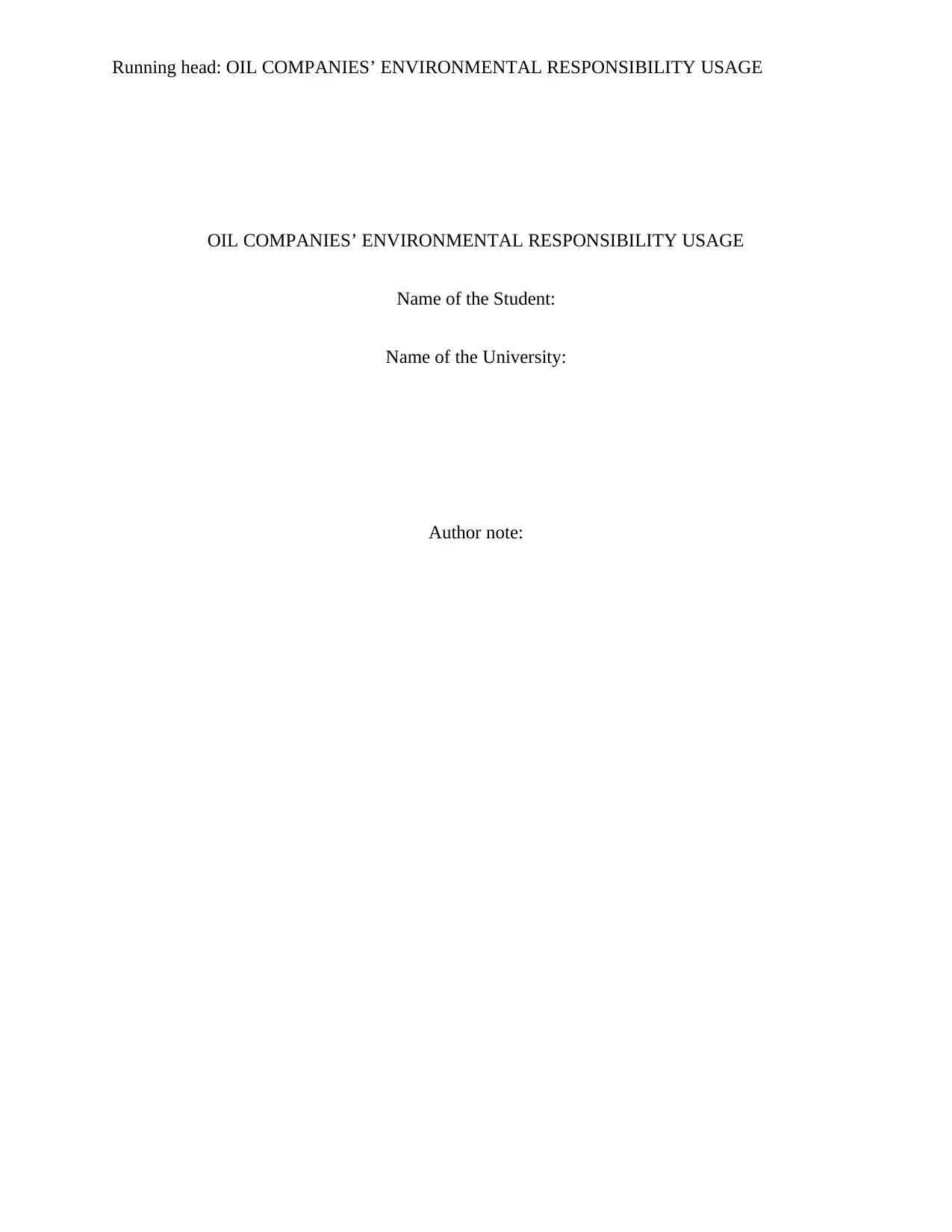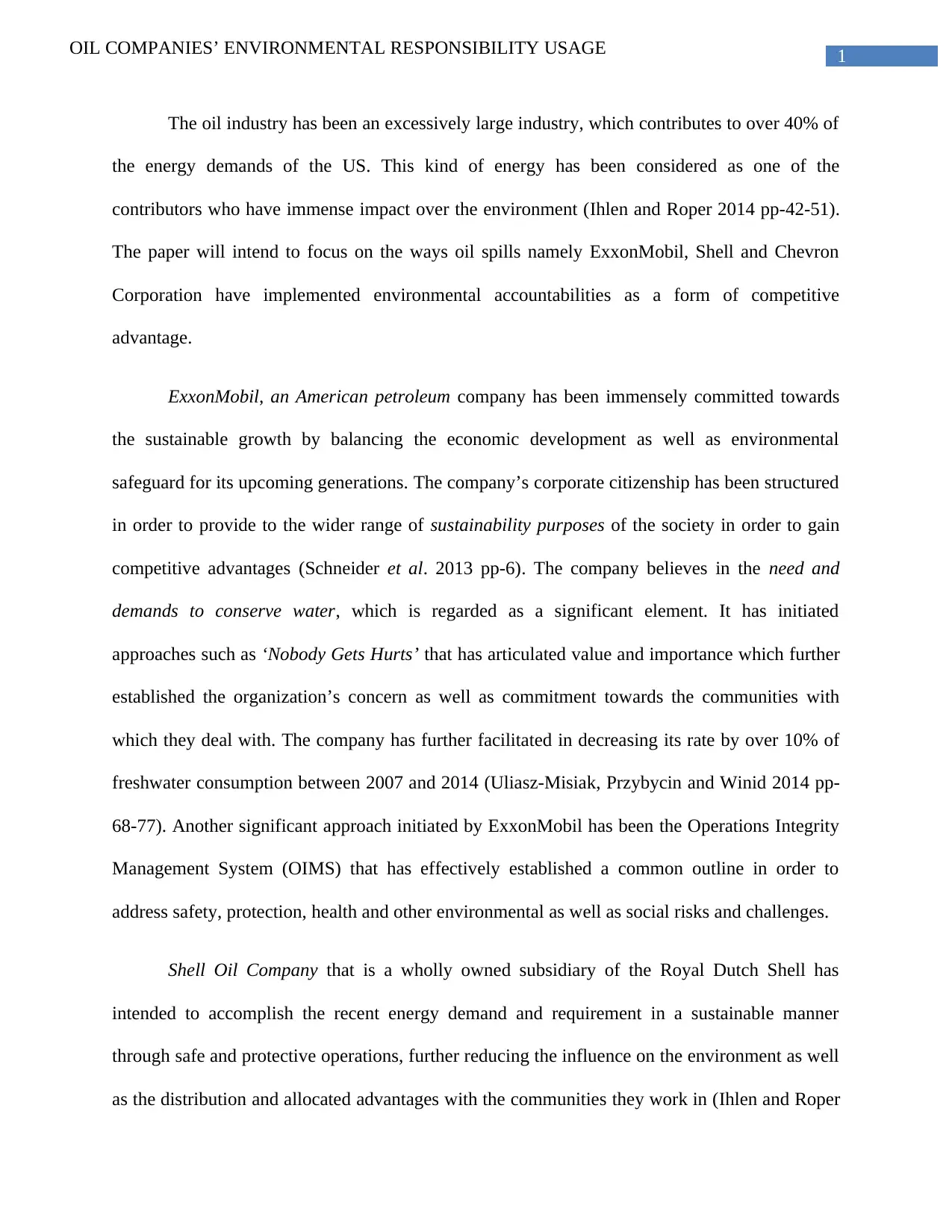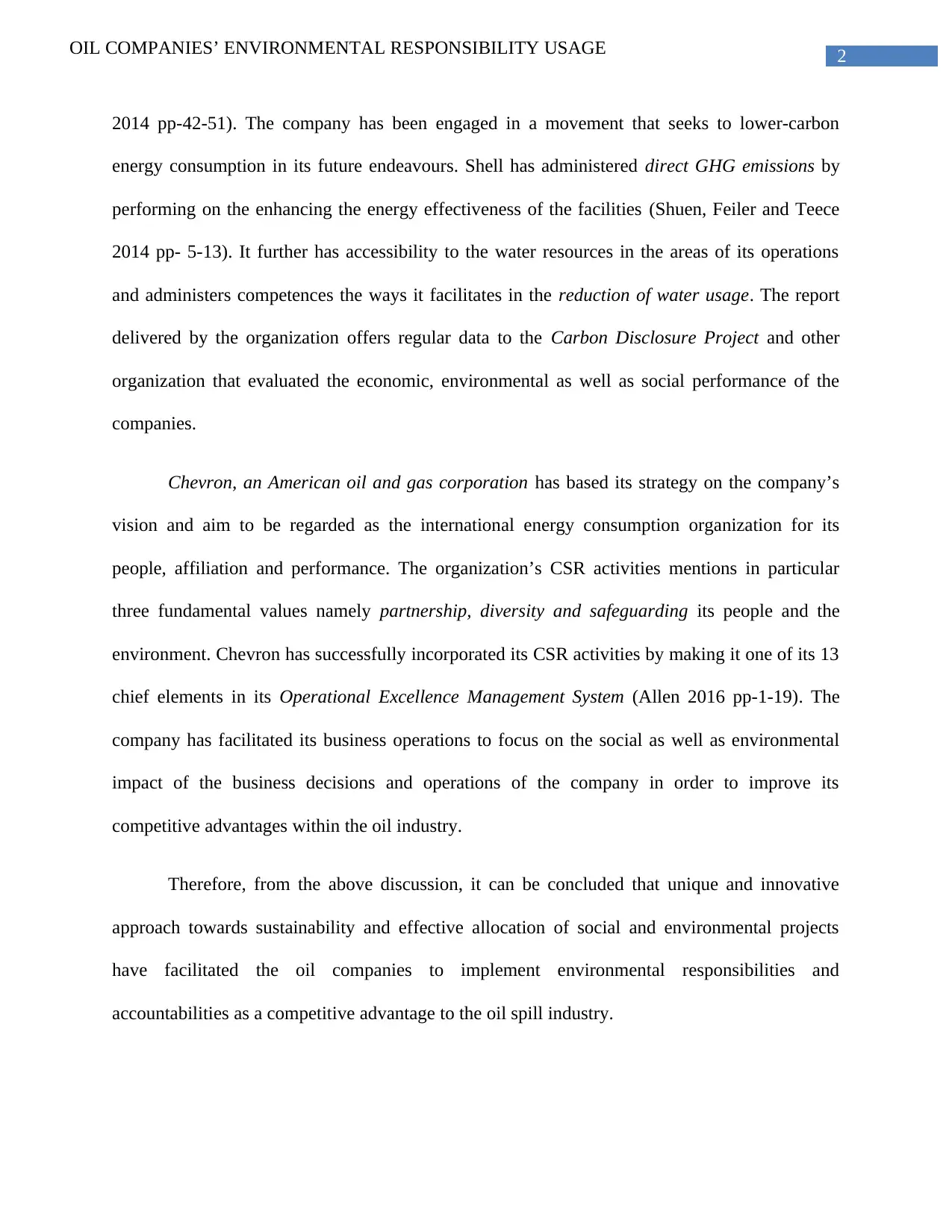Oil Companies’ Environmental Responsibility Usage
VerifiedAdded on 2023/06/15
|4
|862
|331
AI Summary
This paper focuses on the ways oil spills namely ExxonMobil, Shell and Chevron Corporation have implemented environmental accountabilities as a form of competitive advantage.
Contribute Materials
Your contribution can guide someone’s learning journey. Share your
documents today.

Running head: OIL COMPANIES’ ENVIRONMENTAL RESPONSIBILITY USAGE
OIL COMPANIES’ ENVIRONMENTAL RESPONSIBILITY USAGE
Name of the Student:
Name of the University:
Author note:
OIL COMPANIES’ ENVIRONMENTAL RESPONSIBILITY USAGE
Name of the Student:
Name of the University:
Author note:
Secure Best Marks with AI Grader
Need help grading? Try our AI Grader for instant feedback on your assignments.

1OIL COMPANIES’ ENVIRONMENTAL RESPONSIBILITY USAGE
The oil industry has been an excessively large industry, which contributes to over 40% of
the energy demands of the US. This kind of energy has been considered as one of the
contributors who have immense impact over the environment (Ihlen and Roper 2014 pp-42-51).
The paper will intend to focus on the ways oil spills namely ExxonMobil, Shell and Chevron
Corporation have implemented environmental accountabilities as a form of competitive
advantage.
ExxonMobil, an American petroleum company has been immensely committed towards
the sustainable growth by balancing the economic development as well as environmental
safeguard for its upcoming generations. The company’s corporate citizenship has been structured
in order to provide to the wider range of sustainability purposes of the society in order to gain
competitive advantages (Schneider et al. 2013 pp-6). The company believes in the need and
demands to conserve water, which is regarded as a significant element. It has initiated
approaches such as ‘Nobody Gets Hurts’ that has articulated value and importance which further
established the organization’s concern as well as commitment towards the communities with
which they deal with. The company has further facilitated in decreasing its rate by over 10% of
freshwater consumption between 2007 and 2014 (Uliasz-Misiak, Przybycin and Winid 2014 pp-
68-77). Another significant approach initiated by ExxonMobil has been the Operations Integrity
Management System (OIMS) that has effectively established a common outline in order to
address safety, protection, health and other environmental as well as social risks and challenges.
Shell Oil Company that is a wholly owned subsidiary of the Royal Dutch Shell has
intended to accomplish the recent energy demand and requirement in a sustainable manner
through safe and protective operations, further reducing the influence on the environment as well
as the distribution and allocated advantages with the communities they work in (Ihlen and Roper
The oil industry has been an excessively large industry, which contributes to over 40% of
the energy demands of the US. This kind of energy has been considered as one of the
contributors who have immense impact over the environment (Ihlen and Roper 2014 pp-42-51).
The paper will intend to focus on the ways oil spills namely ExxonMobil, Shell and Chevron
Corporation have implemented environmental accountabilities as a form of competitive
advantage.
ExxonMobil, an American petroleum company has been immensely committed towards
the sustainable growth by balancing the economic development as well as environmental
safeguard for its upcoming generations. The company’s corporate citizenship has been structured
in order to provide to the wider range of sustainability purposes of the society in order to gain
competitive advantages (Schneider et al. 2013 pp-6). The company believes in the need and
demands to conserve water, which is regarded as a significant element. It has initiated
approaches such as ‘Nobody Gets Hurts’ that has articulated value and importance which further
established the organization’s concern as well as commitment towards the communities with
which they deal with. The company has further facilitated in decreasing its rate by over 10% of
freshwater consumption between 2007 and 2014 (Uliasz-Misiak, Przybycin and Winid 2014 pp-
68-77). Another significant approach initiated by ExxonMobil has been the Operations Integrity
Management System (OIMS) that has effectively established a common outline in order to
address safety, protection, health and other environmental as well as social risks and challenges.
Shell Oil Company that is a wholly owned subsidiary of the Royal Dutch Shell has
intended to accomplish the recent energy demand and requirement in a sustainable manner
through safe and protective operations, further reducing the influence on the environment as well
as the distribution and allocated advantages with the communities they work in (Ihlen and Roper

2OIL COMPANIES’ ENVIRONMENTAL RESPONSIBILITY USAGE
2014 pp-42-51). The company has been engaged in a movement that seeks to lower-carbon
energy consumption in its future endeavours. Shell has administered direct GHG emissions by
performing on the enhancing the energy effectiveness of the facilities (Shuen, Feiler and Teece
2014 pp- 5-13). It further has accessibility to the water resources in the areas of its operations
and administers competences the ways it facilitates in the reduction of water usage. The report
delivered by the organization offers regular data to the Carbon Disclosure Project and other
organization that evaluated the economic, environmental as well as social performance of the
companies.
Chevron, an American oil and gas corporation has based its strategy on the company’s
vision and aim to be regarded as the international energy consumption organization for its
people, affiliation and performance. The organization’s CSR activities mentions in particular
three fundamental values namely partnership, diversity and safeguarding its people and the
environment. Chevron has successfully incorporated its CSR activities by making it one of its 13
chief elements in its Operational Excellence Management System (Allen 2016 pp-1-19). The
company has facilitated its business operations to focus on the social as well as environmental
impact of the business decisions and operations of the company in order to improve its
competitive advantages within the oil industry.
Therefore, from the above discussion, it can be concluded that unique and innovative
approach towards sustainability and effective allocation of social and environmental projects
have facilitated the oil companies to implement environmental responsibilities and
accountabilities as a competitive advantage to the oil spill industry.
2014 pp-42-51). The company has been engaged in a movement that seeks to lower-carbon
energy consumption in its future endeavours. Shell has administered direct GHG emissions by
performing on the enhancing the energy effectiveness of the facilities (Shuen, Feiler and Teece
2014 pp- 5-13). It further has accessibility to the water resources in the areas of its operations
and administers competences the ways it facilitates in the reduction of water usage. The report
delivered by the organization offers regular data to the Carbon Disclosure Project and other
organization that evaluated the economic, environmental as well as social performance of the
companies.
Chevron, an American oil and gas corporation has based its strategy on the company’s
vision and aim to be regarded as the international energy consumption organization for its
people, affiliation and performance. The organization’s CSR activities mentions in particular
three fundamental values namely partnership, diversity and safeguarding its people and the
environment. Chevron has successfully incorporated its CSR activities by making it one of its 13
chief elements in its Operational Excellence Management System (Allen 2016 pp-1-19). The
company has facilitated its business operations to focus on the social as well as environmental
impact of the business decisions and operations of the company in order to improve its
competitive advantages within the oil industry.
Therefore, from the above discussion, it can be concluded that unique and innovative
approach towards sustainability and effective allocation of social and environmental projects
have facilitated the oil companies to implement environmental responsibilities and
accountabilities as a competitive advantage to the oil spill industry.

3OIL COMPANIES’ ENVIRONMENTAL RESPONSIBILITY USAGE
References
Allen, M., 2016. Sustainability and Communication. In Strategic Communication for Sustainable
Organizations (pp. 1-19). Springer, Cham.
Ihlen, Ø. and Roper, J., 2014. Corporate reports on sustainability and sustainable
development:‘We have arrived’. Sustainable development, 22(1), pp.42-51.
Schneider, J., Ghettas, S., Merdaci, N., Brown, M., Martyniuk, J., Alshehri, W. and Trojan, A.,
2013. Towards sustainability in the oil and gas sector: benchmarking of environmental, health,
and safety efforts. Journal of Environmental Sustainability, 3(3), p.6.
Shuen, A., Feiler, P.F. and Teece, D.J., 2014. Dynamic capabilities in the upstream oil and gas
sector: Managing next generation competition. Energy Strategy Reviews, 3, pp.5-13.
Uliasz-Misiak, B., Przybycin, A. and Winid, B., 2014. Shale and tight gas in Poland—legal and
environmental issues. Energy Policy, 65, pp.68-77.
References
Allen, M., 2016. Sustainability and Communication. In Strategic Communication for Sustainable
Organizations (pp. 1-19). Springer, Cham.
Ihlen, Ø. and Roper, J., 2014. Corporate reports on sustainability and sustainable
development:‘We have arrived’. Sustainable development, 22(1), pp.42-51.
Schneider, J., Ghettas, S., Merdaci, N., Brown, M., Martyniuk, J., Alshehri, W. and Trojan, A.,
2013. Towards sustainability in the oil and gas sector: benchmarking of environmental, health,
and safety efforts. Journal of Environmental Sustainability, 3(3), p.6.
Shuen, A., Feiler, P.F. and Teece, D.J., 2014. Dynamic capabilities in the upstream oil and gas
sector: Managing next generation competition. Energy Strategy Reviews, 3, pp.5-13.
Uliasz-Misiak, B., Przybycin, A. and Winid, B., 2014. Shale and tight gas in Poland—legal and
environmental issues. Energy Policy, 65, pp.68-77.
1 out of 4
Your All-in-One AI-Powered Toolkit for Academic Success.
+13062052269
info@desklib.com
Available 24*7 on WhatsApp / Email
![[object Object]](/_next/static/media/star-bottom.7253800d.svg)
Unlock your academic potential
© 2024 | Zucol Services PVT LTD | All rights reserved.
